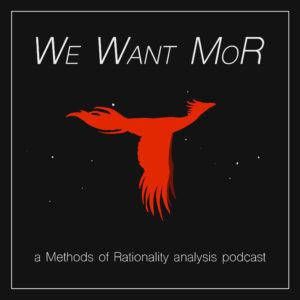
Expecto Patronum!
Original chapters, written by Eliezer Yudkowsky, can be read here and the audiobook chapters, recorded by Eneasz Brodski, can be found earlier in this podcast feed and on the website.
Next episode we are doing a retro of Book 2 (chapters 22 – 37) with ChronOblivion!
Album art courtesy of Lorec. Thank you!
Coy manages an RSS feed that compiles the relevant audiobook chapters with the WW MoR counterparts. Just copy and paste that link into your favorite podcast app in the “add by url” option. Thanks, Coy!
Podcast: Play in new window | Download | Embed
Subscribe: RSS



 RSS – All Posts
RSS – All Posts Stitcher Smart Radio
Stitcher Smart Radio Google Play
Google Play

There actually is an awesome HPMOR fanart featuring human patronus. I love this art, even have it saved on my phone. https://www.deviantart.com/soma-0/art/HPMOR-1-514522314
To Brian’s “who decides” question: The answer is no one. You always stipulate a High Jedi Council decreeing who is and isn’t worthy from above based on their own biases and whims, thus simply recreating some form of unfair system subject to politics. But the whole point would be that no one teaches these theories to anyone and the only people who talk about it are those that already proved to each other (through subtle hints for instance) that they already know.
I’m not saying that I am personally in favor of such a thing, I just want you to understand what the theory is in the first place and why, in a world where people actually care about this rule, politics and corruption wouldn’t make this rule completely pointless.
Of course as far as we know this isn’t really applicable to the real world where all science is pretty much done in large collaborations and small increments. But at least the magical world of Harry Potter is one where even a single dedicated wizard can research a new superweapon and, more importantly, the resources needed to fire this superweapon is either a single wand or a wand and some other probably obtainable stuff. It makes sense for the wizarding world to ere on the side of caution after losing a country or two.
On the other hand it seems that this attitude has taken a large toll as its price. Not only does ancient magic seem more awesome than modern magic, the wizarding world is also much much less scientifically advanced despite how tool advantages should lead to the opposite, as seen by the exponential development of the muggle world. Like, remember how amazed Draco was by the moon landing? For all we know multiple wizards in history have gone to the moon, visited a meteor or two, become aware of how easy it would be to push one of those onto a city, and decided to shut up about it to anyone other than their fellows in the secret space explorer club.
As for the subtle Quirrel eating Dementors joke, I must say that it never occurred to me. Nor did I read it in other people’s comments. So congrats and thanks for pointing it out.
The only thing I can add to it is that SUPPOSEDLY no one present other than Harry even know that Dementors=Death. But for all we know Quirrel does and just also keeps quiet about it. Or he doesn’t and it was a subtle message (or red herring) of the author to us readers.
I think you’re right about that.
The number one downside of wizarding secrecy culture and the Interdict is not some group of powerful people deciding who gets to know about powerful information. The problem is that almost NOBODY gets to know powerful information that they can’t find out all by themselves.
This is a lot safer than the alternative in their universe since magic is so incredibly dangerous, but it also completely stunts the progression of knowledge even to the point of knowledge being lost over time.
If everyone has to discover things all by themselves before they can know it nobody is ever building upon anyone else’s work. No wizard stands upon the shoulders of giants. (At least not figuratively)
We take for granted that in the real world we have a rich history of knowledge available for us to build upon and that later generations will be able to do the same with our own discoveries. Without that flow of information between generations we would be royally fucked.
Judging based on what we know about how physical abuse effects children I don’t think it makes any sense to assume that the kids in Sparta were more mature.
They were certainly better at physical combat and at either hiding emotions or expressing them exclusively through violence, but trauma like that is totally different from maturity.
It’s easy to assume that anyone who has faced adversity has grown from it, but unfortunately that’s just not true. If the situation is horrible enough to completely overload a person it becomes destructive instead of being a growth experience.